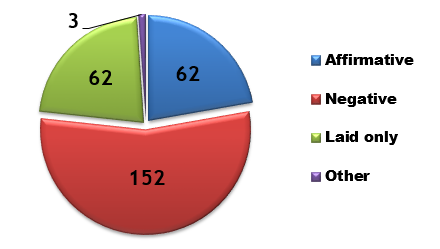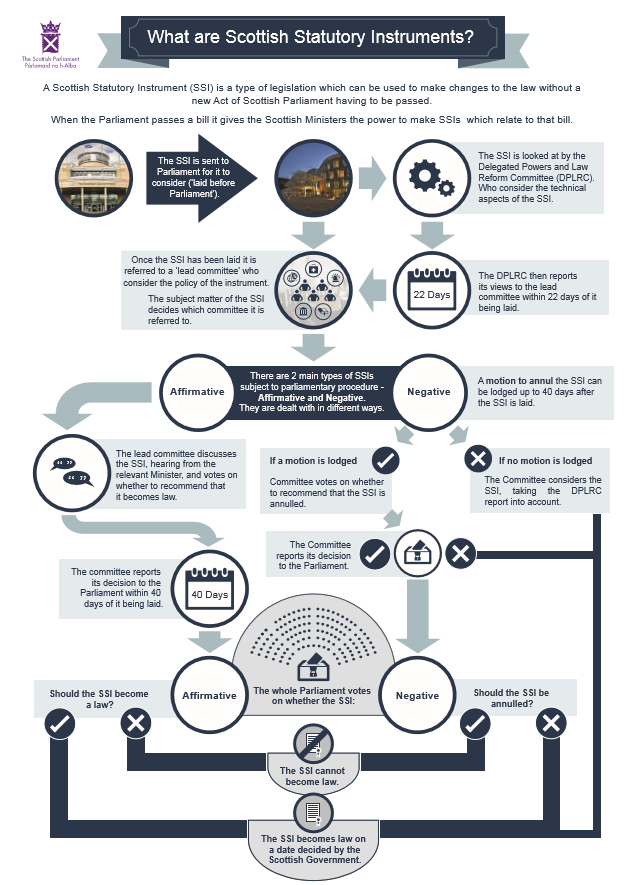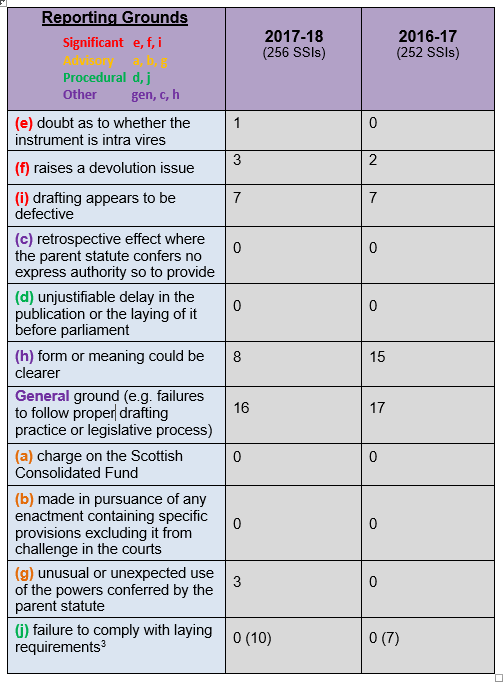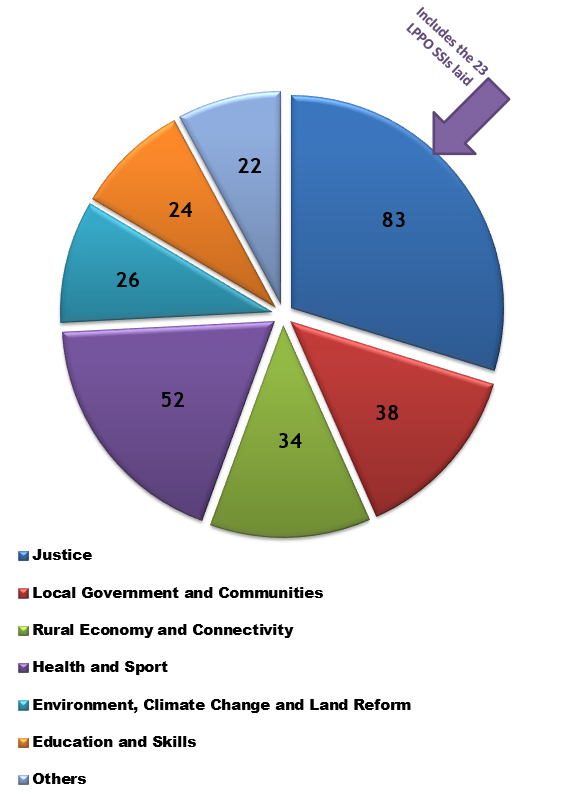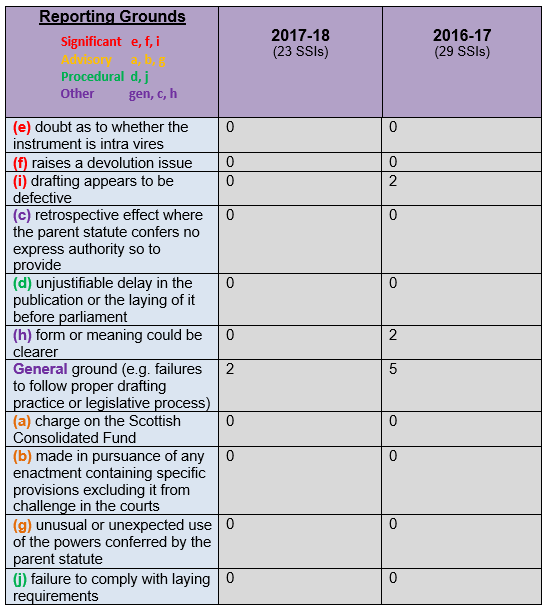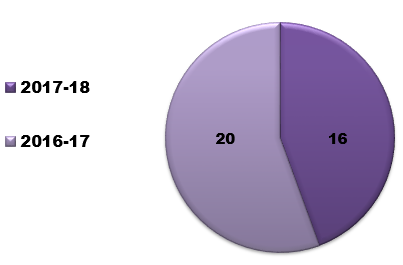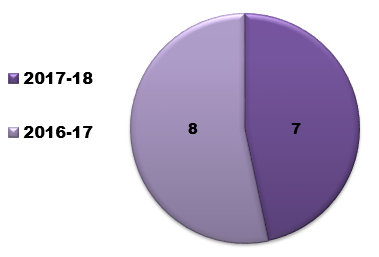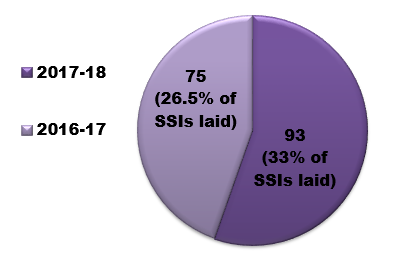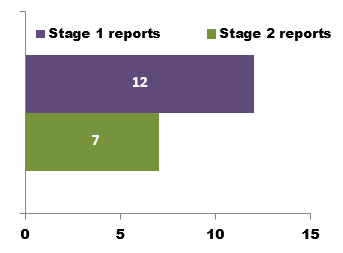Delegated Powers and Law Reform Committee
Work of the Delegated Powers and Law Reform Committee in 2017-18
Introduction
This report reflects upon the work of the Delegated Powers and Law Reform (DPLR) Committee in 2017-18, the second year of the fifth session of the Scottish Parliament. Reports of this nature have been produced by this Committee and its predecessor committee since 2012.
The Delegated Powers and Law Reform Committee’s remit encompasses a number of different roles, but its primary focus is upon the scrutiny of delegated powers in bills and Scottish Statutory Instruments (SSIs) and this report focuses on those roles.
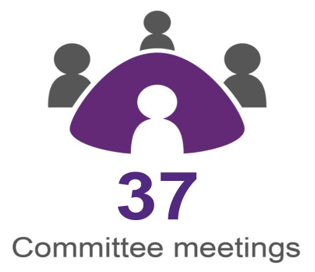
In performing these roles the Committee has two specific objectives:
to ensure that Scots law is clear, accessible, and operable; and
to hold the responsible authority (primarily the Scottish Government) to account.
This report and the quarterly reports the Committee produces over the course of the reporting year are integral to meeting these objectives. Specifically, this report:
reviews the quality of the instruments laid by the Scottish Government and in doing so it holds the Government to account while seeking to drive continuous improvement in the quality of SSIs laid;
considers the Committee's scrutiny of delegated powers in primary legislation. The report reflects on issues that have arisen in relation to the scrutiny of delegated powers and the Committee's effectiveness in persuading the Scottish Government to bring forward amendments to the legislation to respond to these issues identified by the Committee; and
looks ahead to the coming year. Secondary legislation from the European Union (Withdrawal) Act 2018 is currently progressing through the UK Parliament. In some instances the Scottish Government is seeking approval from the Scottish Parliament that it might consent to the UK Government to legislate, using UK SIs, in areas of devolved competence. SSIs stemming from the Act are also expected to be laid in the coming months at the Scottish Parliament.
This report is therefore part of a broader process of holding the Scottish Government to account.The Committee will also take evidence from the Minister for Parliamentary Business and Veterans to respond to issues raised in the report.
It should also be noted that the report considers the quality of the instruments laid by the Lord President's Private Office (LPPO). More on the role of the LPPO can be found at page 15 of this report.
What is an SSI?
Before looking at the instruments which were laid in 2017-18, it is always useful to explain what Scottish Statutory Instruments are:
SSIs are a form of law made by the Scottish Ministers (or other responsible authority such as the Lord President) exercising powers granted by, or which have been transferred to, the Scottish Parliament.
SSIs are usually in the form of regulations, orders, rules or schemes. They generally set out technical details or administrative matters necessary for primary legislation to operate, but can cover any subject matter ranging from criminal penalties, licensing schemes, implementing EU obligations, prescribing application forms, to providing procedural rules.
The content of SSIs is, however, limited by the terms of the primary legislation which authorises their use – referred to as the enabling power or parent Act – and by the general rules on the legislative competence of the Scottish Parliament set out in the Scotland Act 1998.
The role of the Committee is then to consider the instruments from a technical perspective. It will:
scrutinise SSIs on behalf of the Parliament to ensure that proposed laws are within the powers the Parliament has delegated to Ministers in the parent Act – a law which is not within the enabling powers is invalid and has no legal effect;
check the quality of each SSI to ensure that it is accurate, achieves the intended policy and the drafting is clear to the end user; and
through exchange of correspondence and its reports, encourage and police corrective action by the Scottish Government and other rule making authorities.
The policy issues raised by SSIs are considered separately by the Scottish Parliament's various subject committees such as Justice, Health and Sport and the Environment, Climate Change and Land Reform Committees. These are known as the 'lead committees'.
Instruments considered in 2017-18
Overview
In the parliamentary year 2017-18, the Committee considered a total of 279 instruments laid before the Parliament. This is only 2 fewer instruments than considered in 2016-17 so overall numbers remain steady. Of the 279 instruments , 256 instruments were laid by the Scottish Government and 23 instruments were laid by the LPPO.
Figure 1: Number of SSIs laid by procedure
The 256 SSIs laid by the Scottish Government can be broken down as follows—
2 super-affirmative instruments;
62 affirmative instruments;
149 negative instruments;
42 laid no-procedure instruments; and
1 document laid for approval.
The 23 SSIs laid by the LPPO can be broken down as follows—
3 negative instruments; and
20 laid no-procedure instruments.
This report looks at the quality of the instruments laid by the Scottish Government and the LPPO in turn, identifying trends and encouraging improvement where necessary.
What are the different types of instrument
SSIs are not all the same as different procedures can be used. The type of procedure generally relates to the significance of the instrument and the changes it will make.
The three most common procedures are:
Affirmative – this procedure is attached to instruments relating to significant matters and provides for a greater level of scrutiny than the other two main procedures. Before an instrument which is subject to the affirmative procedure can be made and brought into force, it must be approved by the Parliament.
Negative – this is the most common procedure attached to instruments laid before the Parliament. It is generally attached to instruments relating to matters of less significance than those subject to affirmative procedure. While the Parliament does not need to approve negative instruments before they can come into force, the Parliament can annul a negative instrument.
Laid no-procedure – these are instruments subject to the lowest level of scrutiny in the Parliament. They are laid before the Parliament for technical scrutiny and neither require approval nor can they be annulled.
How does the Committee report instruments?
Before examining the quality of the instruments laid by the Scottish Government this year, it is useful to reflect on how the Committee reports instruments. In considering each instrument the Committee is guided by a set of reporting grounds.
Rule 10.3 of Standing Orders outlines these reporting grounds. In order to make these more understandable and reflective of the extent of the Committee's concerns, the Committee has developed a hierarchy of reporting grounds. “Significant grounds” represent those areas which would cause the Committee most concern; “other grounds” consist of areas where that concern would not be so significant, but nonetheless the matters can affect the understanding of an instrument if not its validity; and “advisory grounds” relate to matters which the Committee wishes to draw to the attention of the Parliament or lead committee.
Below is the full list of reporting grounds listed by their significance:
Significant grounds:
ground (e) – (doubt as to whether it is intra vires);
ground (f) – (raises a devolution issue); and
ground (i) – (drafting appears to be defective).
Other grounds:
ground (c) – (where the instrument has retrospective effect where the parent statute confers no express authority so to provide);
ground (d) – (unjustifiable delay in publication or laying);
ground (h) – (clarity of form or meaning); and
the general reporting ground (which includes minor drafting errors and failures to follow proper drafting practice).
Advisory grounds:
ground (a) – (charges on or payments to the Scottish Consolidated Fund);
ground (b) – (made in pursuance of any enactment containing specific provisions excluding it from challenge in the courts);
ground (g) – (unusual or unexpected use of the powers conferred by the parent statute); and
ground (j) – (non-compliance with laying requirements), where the Committee is satisfied with the reasons given for non-compliance.
The intention of this approach is to enable the Scottish Government, lead committees, stakeholders and the public more generally to understand the extent of the Committee's concerns and respond accordingly.
Process of the consideration of an SSI
After the Delegated Powers and Law Reform Committee has considered an instrument from a technical perspective, the subject committee within whose remit the instrument falls then has an opportunity to consider the instrument from a policy perspective.
The following infographic explains the process by which an instrument is taken through the Parliament.
How many instruments were considered this year?
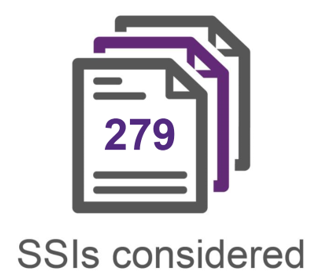
The majority of the instruments laid before the Parliament are laid by the Scottish Government.
Table 1 below sets out the number of instruments laid by the Scottish Government in 2017-18 and the percentage of those that were reported by the Committee. The table also provides the equivalent figure for the previous year by way of comparison.
Table 1: Instruments laid by the Scottish Government reported on by the Committee
What's immediately noticeable from the table is the similarity between the figures for 2016-17 and 2017-18. In relation to wider trends, the number of Scottish Government instruments has dropped considerably since 2015-16 when 301 instruments were considered. This too was a major fall from previous years: in 2013-14, 353 instruments were considered and in 2010-11 that figure reached a high of 422.
In evidence to the Committee last year, the then Minister for Parliamentary Business, Joe FitzPatrick MSP, responded to a question on the reduction in instruments being laid:
The number of instruments fluctuates depending on the legislation and the requirements, and there is no aim to hold back instruments. As much as possible, we try to manage the programme so that instruments are laid over the year.i
If this reduction in the number of instrument reflects better management of the secondary legislation programme then this is to be welcomed and the Committee thanks the Scottish Government for its efforts. The Committee is nevertheless aware that legislation containing substantial numbers of delegated powers, such as the Social Security (Scotland) Act 2018, may result in an upturn of secondary legislation over the coming years.
For the year 2018-19, the Committee is also expecting a number of SSIs to be laid stemming from the UK's withdrawal from the European Union. The Committee will therefore continue to monitor overall numbers to ensure that the Parliament is able to undertake effective scrutiny of all instruments.
How may instruments were reported on this year?
Table 1 from the previous section outlines that the number of Scottish Government instruments drawn to the Committee's attention was the same in both 2016-17 and 2017-18. The slight increase in the total numbers SSIs considered in 2017-18 resulted in a 0.5% drop in the overall reporting percentage.
The Committee welcomed the continued improvement in the quality of instruments laid by the Scottish Government in its 2016-17 report and it is very happy to restate that message for the past year. Indeed, in the third quarter of the reporting year the Committee wrote to the Minister for Parliamentary Business to congratulate the Scottish Government for the lowest level of instruments reported on since the production of quarterly reports began.
The Committee very much welcomes the improvement in the quality of secondary legislation and encourages the Scottish Government to maintain and build upon these high standards.
Summary of use of reporting grounds
As discussed earlier in the report, instruments are reported by the Committee under one of eleven grounds as set out in rule 10.3 of Standing Orders.
Table 2: Instruments reported on broken down by ground
In its report for 2016-17 the Committee highlighted its disappointment when instruments are reported under multiple grounds. It said that, while the overall picture in terms of the quality of instruments was improving, there remained a small number of instruments which were not reflecting that overall improvement in quality.
The Committee continues to encourage the Scottish Government to ensure that all instruments reflect the general improvement in the quality of instruments laid by the Scottish Government.
The Committee also notes the small rise in the number of instruments reported under the most significant reporting grounds - from 9 to 11 - including one reported as being doubtful as to whether it is intra vires (within the powers of the parent Act). The figure is also a large rise from 2015-16, when only 4 SSIs were reported under the most significant reporting grounds.
Each SSI reported under the more significant reporting grounds is indicative of a serious concern about the instrument. The Committee is disappointed to see that the number of instruments drawn to the attention of the Parliament under reporting ground (i) has increased and would encourage the Scottish Government to endeavour to avoid laying instruments that contain errors of such significance that they engage the defective drafting ground. The Committee would be concerned if the numbers of instruments reported under this ground continued to increase. The Committee will be paying close regard to any instruments engaging this ground.
On a more positive note, the Committee is heartened by the substantial decrease - from 15 to 8 - in instruments reported for lack of clarity (ground (h)). In its 2016-17 report the Committee called on the Scottish Government to re-double its efforts to ensure that instruments are drafted in a clear and accessible manner. This appears to have been acted upon.
The continued focus of this Committee and its predecessor committee has been to ensure that legislation is drafted in a way that is clear and understandable to the end user. This reduction by the Scottish Government is therefore to be saluted and the Committee only asks that these high standards are maintained over the coming year.
Which Committees received the most instruments?
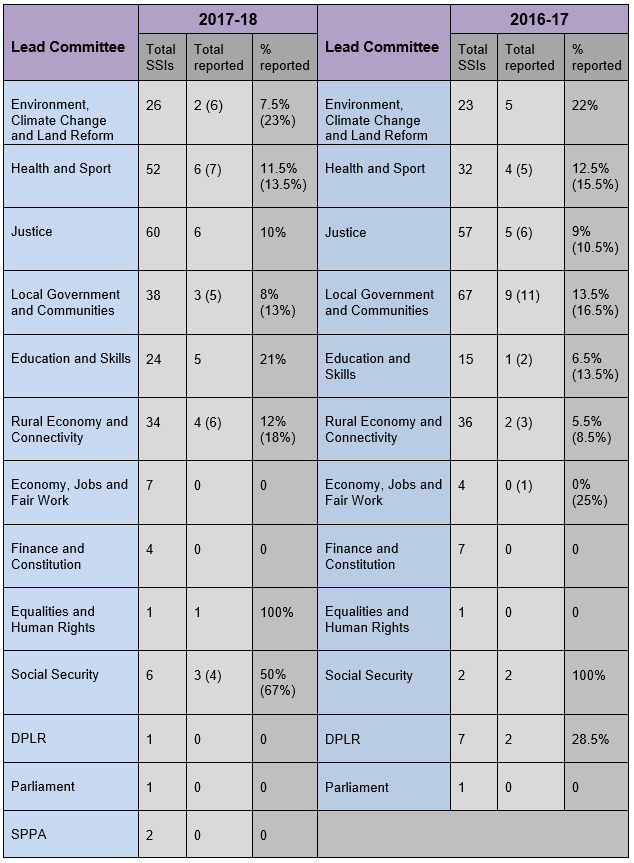
The table shows significant increases to the number of instruments received by the Health and Sport Committee (from 32 to 52) and Education and Skills Committee (15 to 24). Although their numbers have stayed relatively steady, the Justice (60), Local Government and Communities (38), Rural Economy and Connectivity (34) and Environment, Climate Change and Land Reform (26) Committees continue to carry a large legislative burden. The Social Security Committee, whose total number of SSIs is still relatively low (6), considered triple the number it did in 2016-17 and that figure is expected to rise further as the provisions under the Social Security (Scotland) Act 2018 are commenced.
The pie chart below pulls figures from table 3 to better illustrate the number of instruments that were referred to the various subject committees during 2017-18.
Figure 2: Instruments referred to subject committees
Turning to the percentage of instruments being reported, only the Education and Skills Committee stands out as a committee which received a notably poorer standard of instrument than another. However, numbers wise this only accounted for 5 out of 24 SSIs so based on this low sample size it is difficult to draw out any wider statistical trends. There does not therefore appear to be any one committee which received a notably poorer standard of instrument than another.
Instruments from the Lord President's Private Office
Instruments can be laid by the Lord President's Private Office (LPPO) on behalf of the Court of Session and High Court of Justiciary. These instruments are used to update court rules in Scotland and can be split into two distinct camps:
Acts of sederunt are used primarily to regulate civil procedure in the Court of Session and Sheriff Courts
Acts of adjournal are concerned with regulating criminal procedure in the High Court of Justiciary and Sheriff Courts
Both acts of sederunt and acts of adjournal are subject to the same level of scrutiny by the Committee as any other SSI. They are laid by the LPPO as the Lord President is the head of the judiciary in Scotland.
These instruments are laid separately from those laid by the Scottish Government so a separate analysis of the quality of these instruments is provided below.
Table 4: Instruments laid by the LPPO
This table shows there has been a small decrease in the number of instruments laid by the LPPO but that this has been accompanied by a significant reduction in the total number reported (falling from 6 to 2). This reduction points to a welcome trend. Looking back to the Committee's 2015-16 report on instruments laid, 45% of SSIs were reported on (10 of 22) compared to only 8.5% in 2017-18.
Table 5 breaks down the instruments reported on into the grounds under which they were reported and provides the equivalent information for the previous reporting period.
Table 5: LPPO instruments reported on broken down by ground
As well as the number of instruments being reported falling, the significance of the reporting grounds has decreased. Both instruments reported in 2017-18 were drawn to the attention of the Parliament under the general reporting ground, whereas 2 0f the 7 instruments in 2016-17 were reported for being defectively drafted.
As with Scottish Government instruments, the Committee very much welcomes the improvement in the quality of secondary legislation laid by the LPPO and likewise encourages it to maintain and build upon these high standards.
General comments on SSIs
Over the course of the reporting year, the Scottish Government laid a high number of amending instruments which corrected errors in instruments that were drawn to the attention of the Parliament by the Committee. Only 4 commitments given to correct errors in instruments identified by the Committee during this reporting period remain outstanding.
The pie chart below shows the number of Scottish Government commitments outstanding as at the end of each of the last two parliamentary years. This includes commitments outstanding from both this reporting period and previous years
Figure 3: Number of outstanding Scottish Government commitments
The number of outstanding commitments has previously been pursued by this Committee and its predecessor committee in Session 4. The general trend has been a downward one and there has been a fall from 20 to 16 in the past year. 24 amending instruments were laid by the Scottish Government this year - by far the largest number laid over the course of any one year.
During the Committee's session with the Minister for Parliamentary Business in December 2017, Mr FitzPatrick said that it was a priority for the Scottish Government to continue to shorten the list of outstanding commitments. Mr FitzPatrick added:
We have asked officials across the Government to look at the remaining commitments to see where we think that we can meet them, and to check whether there are some that do not require further action and regarding which we should accept that what is in place is working and that the commitment is no longer required. We hope to come back to the committee early in the new year to expand on how we will manage that. It is a reasonable point to make. We made those commitments and we should be able to say what we will do.i
While the Committee again recognises the progress made by the Scottish Government in meeting these commitments, the Committee would welcome greater effort to meet the historic commitments. It has also not yet received an update on how and when these historical commitments will be met.
The Committee continues to encourage the Scottish Government to endeavour to meet all of the historic commitments made to the Committee and to do so as soon as possible.
The Committee would again welcome an indication from the Scottish Government as to the progress it is making on each of the historic commitments. The Committee also recognises that there may be some commitments that the Scottish Government no longer consider necessary or cannot be undertaken at this time. The Committee will consider each commitment and any arguments as to why it is not possible or necessary to meet it.
The LPPO laid amending instruments to correct the 2 errors identified by the Committee during the course of the year. The LPPO also has no historical commitments outstanding.
The Committee welcomes the LPPO’s continued diligence in meeting its commitments.
A list of all amending instruments laid by both the Scottish Government and the Lord President’s Private Office can be found at ANNEX B. A list of all commitments that have yet to be met can also be found in ANNEX B.
Withdrawal of instruments
If concerns are raised by the Committee in relation to affirmative SSIs, the Scottish Government can withdraw the instruments during their passage through the Parliament. In 2017-18, there has been a further drop in SSIs which required to be withdrawn.
Figure 4: Number of draft SSIs/documents withdrawn by the Scottish Government
There has been a positive downward trend in recent years, with 15 instruments requiring to be withdrawn as recently as 2016-17.
Affirmative instruments can be withdrawn at different points in the parliamentary process. The following draft affirmative instruments and documents were withdrawn and subsequently re-laid following correspondence between the Committee's legal advisers and the Scottish Government:
First-tier Tribunal for Scotland General Regulatory Chamber Charity Appeals Cases and Upper Tribunal for Scotland (Composition) Regulations 2018 [draft];
Police Investigations and Review Commissioner (Application and Modification of the Criminal Justice (Scotland) Act 2016) (Scotland) Order 2017 [draft]; and
Code of Conduct for Councillors 2018 (SG/2018/65).
A draft affirmative instrument was also withdrawn by the Scottish Government during this period and not re-laid:
Mental Health (Safeguards for Certain Informal Patients) (Scotland) Amendment Regulations 2017 [draft]
Three draft affirmative instruments were also withdrawn by the Scottish Government following concerns raised by the relevant subject committee:
Mental Health (Absconding) (Miscellaneous Amendments) (Scotland) Regulations 2017 [draft];
Registers of Scotland (Digital Registration, etc.) Regulations 2017 [draft]; and
Land Registration etc. (Scotland) Act 2012 (Amendment) Order 2017 [draft].
While 2 instruments were revoked (the process required for negative instruments) during 2016-17, no negative instruments were revoked during this reporting period.
The Committee welcomes the continued reduction in affirmative instruments which have required to be withdrawn. Nevertheless, the Committee encourages the Scottish Government to endeavour to lay instruments of such a standard that they do not require to be withdrawn.
That no negative instruments required to be revoked during 2017-18 is therefore to be celebrated and the Committee commends the Scottish Government's actions in this area.
Minor points raised
Minor points are generally typographical or referencing errors in instruments. While they do not affect the validity of the instrument, they are nevertheless drafting errors which can point to wider concerns.
The Committee identified a total of 93 instruments on which minor points were raised in the past year. This can be broken down into 84 instruments laid by the Scottish Government and 9 instruments laid by the LPPO.
Figure 5: Number of SSIs containing Minor Points
As the pie chart shows, this is a rise of 18 SSIs from the previous year. It takes the overall percentage of instruments which included minor points from around a quarter in 2016-17 to a third in 2017-18.
While the Committee fully accepts that minor points such as these do not affect the validity of instruments, it suggests that the procedures used by the Scottish Government and LPPO are improved to ensure that the numbers of these types of errors decreases.
Motions to annul
Motions to annul the following instruments were lodged during the parliamentary year 2017-18 by members of the lead committee indicated—
Functions of Health Boards (Scotland) Amendment Order 2017 (SSI 2017/304) (Health and Sport)
Conservation of Salmon (Scotland) Amendment Regulations 2018 (SSI 2018/37) (Environment, Climate Change and Land Reform)
The motion to annul SSI 2017/304 was subsequently withdrawn while the motion to annul SSI 2018/37 was unsuccessful.
Consolidation
As noted at the beginning of this report one of the Committee's objectives, and one which it repeatedly restates, is to ensure that law is clear and accessible to those who use the legislation. An obstacle to that objective is where instruments are amended on a number occasions meaning that the user of the legislation has to refer to multiple instruments to understand what the principal instrument is now doing.
One example of this, which was also highlighted in last year's report, is the Council Tax Reduction (Scotland) Regulations 2012. It has now been amended fifteen times and the Committee continues to raise this with the Scottish Government.
The Convener has raised this with the First Minister at a meeting of the Conveners Group in April 2018. The First Minister said in reply:
It is important to say that although consolidation may have some benefits—I do not deny that—it would not fundamentally change how the scheme works and it would not change how much of a council tax reduction somebody receives.i
In a letter to the Committee of 2 October 2018, the Minister for Public Finance and Digital Economy indicated that the Scottish Government has no plans to undertake the consolidation of the principal Regulations, due to an ongoing programme of amendments as new social security legislation is rolled out.
The Committee, as stated in its 49th report of 2018, continues to encourage the Scottish Government to undertake a consolidation of the Council Tax Reduction (Scotland) Regulations 2012, within a reasonable timescale in the interests of clarity and accessibility.
Quality of accompanying documents
When SSIs are laid before the parliament they are generally accompanied by documents which provide some background to the purpose of the instrument and any additional information. These can be very helpful to readers as it allows them to get a better understanding of the SSI. However, the accessibility of these accompanying documents has been questioned by the Conveners Group, which is a forum where Committee Conveners meet to take a strategic view on the operation of committees.
The Conveners Group wrote to the the Minister for Parliamentary Business in February 2018 questioning the accessibility of documents accompanying SSIs, such as Policy Notes. These were often considered to be excessively complicated and difficult to understand and interpret.
In response, the then Minister for Parliamentary Business, Joe FitzPatrick, provided a number of action points which he said he would take forward, namely:
to review existing guidance on the preparation of Policy Notes to consider whether any improvements are required, such as an “initial introductory summary to improve accessibility” for lengthier Policy Notes;
to ensure the role of Policy Notes is reinforced in the Government’s guidance for officials on the development of SSIs;
to emphasise to his Ministerial colleagues that they should be satisfied that any SSIs they approve are accessible to stakeholders and members of the public; and
that the Scottish Government will provide additional contextual information for any Brexit-related SSIs to ensure that they are also accessible to stakeholders and members of the public.
The current Minister for Parliamentary Business and Veterans, Graeme Dey, has since reinforced Mr FitzPatrick's commitment in this area. At the Committee's meeting on 18 September 2018, Mr Dey said
As a former convener, I share your [the Committee's] concerns and those of the other conveners about the nature of some explanatory notes, which, at times, are not overly explanatory, and the lack of plain English. Substantial work is being done to ensure that we make the consideration process as easy as possible for committees. For example, we are considering providing a covering letter for each instrument that would explain in two or three paragraphs specifically what the instrument does. That is not to insult the intelligence of committee members—it is simply to be helpful. All of us will have read explanatory notes that we have had to reread. The committees’ complaint is legitimate, and we are looking forward to fixing the situation.
The Committee is grateful to the Conveners Group for raising concerns as to the quality of accompanying documents. It also welcomes the Scottish Government's commitment to improve the accessibility of these documents.
The Committee will continue to monitor the quality of accompanying documents and seek updates from the Minister for Parliamentary Business and Veterans on the Scottish Government's progress in this area.
Packages of instruments
Packages of instruments is a group of related instruments laid around the same time usually in relation to the implementation of primary legislation. During the previous reporting year, three packages of instruments prompted particular concern.
In its recommendations in its 2016-17 report, the Committee invited the Scottish Government to give careful consideration to any future packages of instruments it brought forward both in terms of the programming of the laying of the instruments and also the quality control processes applied to those instruments. It added that it would find it highly unsatisfactory if it continued to see packages of instruments of such a disappointing standard.
The Committee is therefore pleased to report that no such issues arose in the past year and welcomes the Scottish Government's progress in this area. It nevertheless calls on the Scottish Government to continue to keep up this good work in the coming years.
There can however be a gap in instruments coming forward from recently passed legislation. For example, the Land Reform (Scotland) Act 2016 contains an array of delegated powers but only a few SSIs have been forthcoming.
The Committee appreciates that considerable work has to be done when bringing forward packages of instruments stemming from an Act. The Committee nevertheless requests that the Scottish Government provide updates to both it and the relevant lead committee about the reasons for any delay as well as the anticipated laying dates to aid future planning.
Instruments relating to the UK’s withdrawal from the European Union
While this report focuses on the previous reporting year, it would be remiss not to consider the potential impact of the European Union (Withdrawal) Act 2018 on the volume of secondary legislation to be considered by the Scottish Parliament in the coming months.
In its first report on the Legislative Consent Memorandum on the European Union (Withdrawal) Bill, the Committee considered the power in the then Bill allowing UK Ministers to make regulations which apply to Scotland and which cover both reserved and devolved matters. While the Committee acknowledged that it “will often make sense for a uniform approach” throughout the UK, the Committee agreed that UK Ministers should only be able to legislate in devolved areas with the consent of the devolved administration. However, before consent is given, the Committee also recommended that there should be a process whereby the Parliament has an opportunity to scrutinise the Scottish Ministers’ position before they grant their consent.
Both the Committee and the Finance and Constitution Committee tasked its officials to work to help deliver the Committee’s recommendations. Michael Russell, who was then the Minister for UK Negotiations on Scotland’s Place in Europe, also committed his officials to work with Scottish Parliament officials to do the same. A working group between Scottish Government and Scottish Parliament staff was subsequently set up.
Two draft protocols were initially published:
the first, known as the SI protocol, gave a process for parliamentary scrutiny of the consent of Scottish Ministers to proposals being taken forward under UK Statutory Instruments under the Bill, known as the SI protocol; while
the second, known as the SSI protocol, focused on the scrutiny of SSIs being made under the Withdrawal Bill.
The Committee welcomed both protocols, including the option that each can be reviewed and revised at a future date.
A finalised SI protocol was agreed by the Committee at its meeting on Tuesday 4 September 2018. While the consent notifications covered by the SI protocol will be considered by subject committees, the Committee will keep a broad oversight of how the process is working in practice. At the time of writing 37 such notifications had been sent to subject committee and more are expected.
A revised SSI protocol will likely be agreed before the first Scottish statutory instruments are laid under the European Union (Withdrawal) Act 2018. These will require to be considered before the UK is scheduled to leave at 11pm on Friday, 29 March 2019.
As the Committee said in its 2016-17 report, the Committee wishes to ensure that secondary legislation stemming from Brexit can be laid and considered in a managed way that is conducive to effective scrutiny. The Committee last spoke to the Minister for Parliamentary Business and Veterans in September 2018 and will continue to have regular updates in the months leading up to 29 March 2019.
Primary legislation
A primary function of the Committee is to consider the delegated powers provisions in any public or private bills introduced in the Parliament. Over the reporting period, the Committee has considered and reported on the following twelve bills at Stage 1:
Wild Animals in Travelling Circuses (Scotland) Bill;
Forestry and Land Management (Scotland) Bill;
Gender Representation on Public Boards (Scotland) Bill;
Children and Young People (Information Sharing (Scotland) Bill;
Social Security (Scotland) Bill;
Islands (Scotland) Bill;
Civil Litigation (Expenses and Group Proceedings) (Scotland) Bill;
Housing (Amendment) (Scotland) Bill;
Historical Sexual Offences (Pardons and Disregards) (Scotland) Bill;
Budget (Scotland) (No.2) Bill;
Planning (Scotland) Bill; and
Scottish Crown Estate Bill.
The Committee also considered and reported on the following seven bills after Stage 2:
Child Poverty (Scotland) Bill;
Seat Belts on School Transport (Scotland) Bill;
Wild Animals in Travelling Circuses (Scotland) Bill;
Forestry and Land Management (Scotland) Bill;
Gender Representation on Public Boards (Scotland) Bill;
Social Security (Scotland) Bill; and
Civil Litigation (Expenses and Group Proceedings) (Scotland) Bill.
Table 6: Number of Committee reports
Scottish Law Commission bills
SLC bills are bills that originate from SLC reports and meet the criteria determined by the Presiding Officer. The criteria for an SLC bill (which is a bill appropriate for referral to this Committee) is that it is a bill within the legislative competence of the Scottish Parliament—
where there is a wide degree of consensus amongst key stakeholders about the need for reform and the approach recommended;
which does not relate directly to criminal law reform;
which does not have significant financial implications;
which does not have significant European Convention on Human Rights (ECHR) implications; and
where the Scottish Government is not planning wider work in that particular subject area.
During 2017-18, the committee consider two such bills:
Contract (Third Party Rights) (Scotland) Bill; and
Prescription (Scotland) Bill
1. Contract (Third Party Rights) (Scotland) Bill
The Committee published its Stage 1 report on the Bill on 12 May 2017. Minor amendments were made to the Bill at Stage 2 which took place on 27 June 2017 and the Bill was passed following Stage 3 proceedings in late September 2017.
2. Prescription (Scotland) Bill
The Prescription (Scotland) Bill aims to amend the law relating to the extinction of civil rights and obligations by the passage of time. It concerns negative prescription only.
The Committee was designated lead committee for the Bill by the Parliamentary Bureau on 21 February 2018. The Committee agreed its approach to the scrutiny of the Bill at Stage 1 a week later and issued a call for written evidence. 14 submissions were received.
The Committee began taking oral evidence on the Bill on 20 March 2018 and heard from the following stakeholders:
20 March - Scottish Government and the Scottish Law Commission
27 March - Law Society of Scotland, Faculty of Advocates, Brodies LLP, Pinsent Masons, Burness Paull LLP, Shephered and Wedderburn
17 April - Dr Andrew Simpson, University of Aberdeen, Dr Eleanor Russell, Glasgow Caledonian University, David Wedderburn OBE (on behalf of RIAS)
24 April - Mike Dailly, Govan Law Centre and Mike Holmyard, Citizens Advice Scotland
1 May - Annabelle Ewing MSP, Minister for Community Safety and Legal Affairs and Scottish Government officials
The Committee published its Stage 1 report on the Bill on 14 June 2018. While the Committee recommended to the Parliament that the general principles of the Bill be agreed to, it called on the Scottish Government to give further consideration to a number of issues ahead of Stage 2. The Bill was subsequently passed at Stage 1 by the Parliament and has since been considered by the Committee at Stage 2, with 2 minor amendments agreed to. The Bill was subsequently passed by Parliament on 8 November 2018.
SLC bills expected in the remainder of the session
The Scottish Government's Programme for Government 2018-19 included consultations on SLC bills such as the law of defamation. However, no SLC bill is expected to be introduced in the 2018-19 parliamentary year.
In its 2016-17 report, the Committee raised questions on the time it had taken to bring SLC bills forward. It asked the Scottish Government to reflect on whether there would be merit in bringing forward bills that make provision for more than one area of law reform at the same time. The Committee restates that question but also asks why there are no proposed SLC bills in the 2018-19 parliamentary year.
Legislative Consent Memorandums
The Committee considered and reported on one Legislative Consent Memorandum (LCM). LCMs are related to UK Parliament bills which seek to change the law or alter Scottish Ministers’ or the Scottish Parliament's powers in relation to devolved matters.
The LCM considered was on the European Union (Withdrawal) Bill. The Committee published its report on the LCM on 17 November 2017 after taking oral evidence from Scottish and UK Ministers as well as academics.
The Committee also considered and reported on a supplementary LCM relating to the European Union (Withdrawal) Bill. It took further oral evidence from the Minister for Negotiations on Scotland’s Place in Europe as well as the Secretary of State for Scotland and the Minister for the Constitution.
While the Scottish Government has said that it will not introduce further legislative consent motions on Brexit bills, the Committee will still fully scrutinise LCMs for Bills which propose delegated powers to Scottish Ministers. It has recently done so on the Trade Bill but will cover this more fully in its future report covering the 2018-19 parliamentary year.
Interparliamentary Forum on Brexit
The Interparliamentary Forum on Brexit was established following the recommendation of the House of Lords European Union Committee’s report Brexit: devolution which recommended that the structures of interparliamentary dialogue within the UK should be strengthened.
The Forum brings together chairs and conveners of the committees scrutinising Brexit-related issues in the Scottish Parliament, National Assembly for Wales, House of Commons and House of Lords. It is intended to provide a forum to discuss the process of the UK’s withdrawal from the European Union, and collective scrutiny of that process in legislatures across the UK.
The Forum has met five times since it was first established:
12 October 2017 at the House of Lords
18 January 2018 at the House of Lords
26 March 2018 at the Scottish Parliament
21 June 2018 at the House of Commons
25 October 2018 at the National Assembly for Wales
The Committee welcomes the establishment of the Forum and the opportunities it provides for interparliamentary relations in the context of Brexit.
Conclusions
Overall, the Committee is heartened by the improvement across a number of areas in the last reporting year. The quality of instruments has continued to improve from both the Scottish Government and, more dramatically, the LPPO.
While there remains concerns with the number of Scottish Government instruments reported under the most serious grounds, there has been a significant reduction in SSIs reported for lack of clarity.
The reduction in the number of instruments being withdrawn, alongside the statistics that no negative instrument has been revoked, is heartening.
The number of historic commitments is also falling. The Committee encourages the Scottish Government to continue to make progress on the remaining commitments.
The 2018-19 parliamentary year will be a challenging one for the Committee, with the expected body of SSIs stemming from the European Union (Withdrawal) Act. The Committee encourages the Scottish Government to continue to work closely with the Committee and the Parliament over the coming months to ensure effective scrutiny of these instruments over what is likely to be a short period of time. The Committee is also mindful that the quality of domestic SSIs should not fall as a result of Brexit related legislation and calls on the Scottish Government to ensure the standard of all instruments remains high.
Annex A - Reporting Grounds: 12 May 2017 to 11 May 2018
(a) charge on the Scottish Consolidated Fund
None
(b) made in pursuance of any enactment containing specific provisions excluding it from challenge in the courts
None
(c) retrospective effect where the parent statute confers no express authority so to provide
None
(d) unjustifiable delay in the publication or the laying of it before Parliament
None
(e) doubt as to whether it is intra vires
First-tier Tribunal for Scotland Housing and Property Chamber (Procedure) Regulations 2017 (SSI 2017/328) Justice
(f) raises a devolution issue
Council Tax Reduction (Scotland) Amendment (No.2) Regulations 2017 (SSI 2017/326) Social Security
Council Tax Reduction (Scotland) Amendment (No. 2) Amendment Regulations 2017 (SSI 2017/357) Social Security
Council Tax Reduction (Scotland) Amendment Regulations 2018 (SSI 2018/69) Social Security
(g) unusual or unexpected use of the powers conferred by the parent statute
Welfare Reform (Consequential Amendments) (Scotland) Regulations 2017 (SSI 2017/182) Education and Skills
Private Housing (Tenancies) (Scotland) Act 2016 (Commencement No. 2 and Saving Provision) Regulations 2017 (SSI 2017/293 (C.21)) Local Government and Communities
Equality Act 2010 (Authorities subject to the Socio-economic Inequality Duty) (Scotland) Regulations 2018 [draft] Equalities and Human Rights
(h) meaning could be clearer
Inquiries into Fatal Accidents and Sudden Deaths etc. (Scotland) Act 2016 (Commencement No. 3, Transitional and Saving Provisions) Regulations 2017 (SSI 2017/155 (C.13)) Justice
Environmental Impact Assessment (Miscellaneous Amendments) (Scotland) Regulations 2017 (SSI 2017/168) Environment, Climate Change and Land Reform
Education (Fees and Student Support) (Miscellaneous Amendments) (Scotland) Regulations 2017 (SSI 2017/180) Education and Skills
Universal Credit (Claims and Payments) (Scotland) Regulations 2017 (SSI 2016/227) Social Security
Private Housing (Tenancies) (Scotland) Act 2016 (Consequential Provisions) Regulations 2017 [draft] Local Government and Communities
Land Reform (Scotland) Act 2016 (Commencement No. 6, Transitory and Saving Provisions) Regulations 2017 (SSI 2017/299 (C.23)) Rural Economy and Connectivity
Agricultural Holdings (Modern Limited Duration Tenancies and Consequential etc. Provisions) (Scotland) Regulations 2017 (SSI 2017/300) Rural Economy and Connectivity
First-tier Tribunal for Scotland Housing and Property Chamber (Procedure) Regulations 2017 (SSI 2017/328) Justice
(i) drafting appears to be defective
M90/A90 Trunk Road (Admiralty Interchange to Dalmeny) (Variable Speed Limits, Actively Managed Hard Shoulder and Bus Lane) Regulations 2017 (SSI 2017/129) Rural Economy and Connectivity
Public Water Supplies (Scotland) Amendment Regulations 2017 (SSI 2017/281) Environment, Climate Change and Land Reform
Land Reform (Scotland) Act 2016 (Commencement No. 6, Transitory and Saving Provisions) Regulations 2017 (SSI 2017/299 (C.23)) Rural Economy and Connectivity
First-tier Tribunal for Scotland Housing and Property Chamber (Procedure) Regulations 2017 (SSI 2017/328) Justice
National Health Service Superannuation Scheme (Scotland) (Miscellaneous Amendments) (No. 2) Regulations 2017 (SSI 2017/434) Health and Sport
(j) failure to comply with laying requirements
Town and Country Planning (Fees for Applications and Deemed Applications) (Scotland) Amendment (No. 2) Regulations 2017 (SSI 2017/149) Local Government and Communities
Loch Carron Urgent Marine Conservation Order 2017 (SSI 2017/158) Environment, Climate Change and Land Reform
Loch Carron Urgent Marine Conservation (No. 2) Order 2017 (SSI 2017/205) Environment, Climate Change and Land Reform
Building (Miscellaneous Amendments) (Scotland) Amendment Regulations 2017 (SSI 2017/214) Local Government and Communities
Common Agricultural Policy (Direct Payments etc.) (Scotland) Amendment (No. 2) Regulations 2017 (SSI 2017/317) Rural Economy and Connectivity
Public and Private Water Supplies (Miscellaneous Amendments) (Scotland) Regulations 2017 (SSI 2017/321) Environment, Climate Change and Land Reform
Council Tax Reduction (Scotland) Amendment (No. 2) Amendment Regulations 2017 (SSI 2017/357) Social Security
Electricity Works (Environmental Impact Assessment) (Scotland) Amendment Regulations 2017 (SSI 2017/451) Environment, Climate Change and Land Reform
Animal Feed (Basic Safety Standards) (Scotland) Regulations 2018 (SSI 2018/15) Rural Economy and Connectivity
National Health Service (General Medical Services Contracts and Primary Medical Services Section 17C Agreements) (Scotland) Amendment Regulations 2018 (SSI 2018/94) Health and Sport
General reporting ground
Education (Fees and Student Support) (Miscellaneous Amendments) (Scotland) Regulations 2017 (SSI 2017/180) Education and Skills
Building (Miscellaneous Amendments) (Scotland) Regulations 2017 (SSI 2017/188) Local Government and Communities
Teachers’ Superannuation and Pension Scheme (Additional Voluntary Contributions) (Scotland) Regulations 2017 (SSI 2017/283) Education and Skills
Individual Learning Account (Scotland) Amendment Regulations 2017 (SSI 2017/288) Education and Skills
First-tier Tribunal for Scotland Housing and Property Chamber (Procedure) Regulations 2017 (SSI 2017/328) Justice
First-tier Tribunal for Scotland General Regulatory Chamber Charity Appeals (Procedure) Regulations 2017 (SSI 2017/364) Justice
First-tier Tribunal for Scotland Health and Education Chamber (Procedure) Regulations 2017 (SSI 2017/366) Justice
Police Pension Scheme (Scotland) Amendment Regulations 2017 (SSI 2017/387) Justice
Education (Listed Bodies) (Scotland) Order 2018 (SSI 2018/7) Education and Skills
Community Care (Provision of Residential Accommodation Outwith Scotland) (Scotland) Amendment Regulations 2018 (SSI 2018/16) Health and Sport
Carers (Scotland) Act 2016 (Review of Adult Carer Support Plan and Young Carer Statement) Regulations 2018 (SSI 2018/33) Health and Sport
National Health Service (General Medical Services Contracts) (Scotland) Regulations 2018 (SSI 2018/66) Health and Sport
National Health Service (Primary Medical Services Section 17C Agreements) (Scotland) Regulations 2018 (SSI 2018/67) Health and Sport
Sheriff Court Fees Order 2018 (SSI 2018/81) Justice
Common Agricultural Policy (Miscellaneous Amendments) (Scotland) Regulations 2018 (SSI 2018/122) Rural Economy and Connectivity
National Health Service Pension Scheme (Scotland) (Additional Voluntary Contributions) Regulations 2018 (SSI 2018/124) Health and Sport
LPPO instruments
Act of Adjournal (Criminal Procedure Rules 1996 Amendment) (Miscellaneous) 2017 (SSI 2017/144) Justice
Act of Sederunt (Summary Application Rules 1999 Amendment) (Trafficking and Exploitation Orders) 2017 (SSI 2017/211) Justice
Annex B - Commitments: 12 May 2017 to 11 May 2018
Amending instruments laid to correct errors identified by the Committee
Scottish Government instruments
Town and Country Planning (Fees for Applications and Deemed Applications) (Scotland) Amendment (No. 2) Regulations 2017 (SSI 2017/149) corrected errors identified in the Town and Country Planning (Fees for Applications and Deemed Applications) (Scotland) Amendment Regulations 2017 (SSI 2017/120)
Environmental Impact Assessment (Miscellaneous Amendments) (Scotland) Regulations 2017 (SSI 2017/168) corrected errors identified in the:
Electricity Works (Environmental Impact Assessment) (Scotland) Regulations 2017 (SSI 2017/101)
Town and Country Planning (Environmental Impact Assessment) (Scotland) Regulations 2017 (SSI 2017/102)
Forestry (Environmental Impact Assessment) (Scotland) Regulations 2017 (SSI 2017/113)
Agriculture, Land Drainage and Irrigation Projects (Environmental Impact Assessment) (Scotland) Regulations 2017 (SSI 2017/114)
Marine Works (Environmental Impact Assessment) (Scotland) Regulations 2017 (SSI 2017/115)
Seed (Fees etc.) (Scotland) Regulations 2017 (SSI 2017/179) corrected errors identified in the:
Seed (Licensing and Enforcement etc.) (Scotland) Regulations 2016 (SSI 2016/68)
Seed (Miscellaneous Amendments) (Scotland) Regulations 2016 (SSI 2016/434)
Education (Fees and Student Support) (Miscellaneous Amendments) (Scotland) Regulations 2017 (SSI 2017/180) corrected errors identified in the Education (Fees, Awards and Student Support) (Miscellaneous Amendments) (Scotland) Regulations 2016 (SSI 2016/82)
Building (Miscellaneous Amendments) (Scotland) Amendment Regulations 2017 (SSI 2017/214) corrected errors identified in the Building (Miscellaneous Amendments) (Scotland) Regulations 2017 (SSI 2017/188)
Renewables Obligation (Scotland) Amendment Order 2017 [draft] corrected errors identified in the Renewables Obligation (Scotland) Amendment Order 2015 [draft]
Water Intended for Human Consumption (Private Supplies) (Scotland) Regulations 2017 (SSI 2017/282) corrected errors identified in the Private and Public Water Supplies (Miscellaneous Amendments) (Scotland) Regulations 2015 (SSI 2015/346)
Sexual Offences Act 2003 (Prescribed Police Stations) (Scotland) Regulations 2017 (SSI 2017/285) corrected errors identified in the Sexual Offences Act 2003 (Prescribed Police Stations) (Scotland) Amendment Regulations 2016 (SSI 2016/187)
National Health Service (General Dental Services) (Scotland) Amendment Regulations 2017 (SSI 2017/289) corrected errors identified in the National Health Service (General Dental Services) (Scotland) Amendment Regulations 2016 (SSI 2016/53)
Public and Private Water Supplies (Miscellaneous Amendments) (Scotland) Regulations 2017 (SSI 2017/321) corrected errors identified in the Public Water Supplies (Scotland) Amendment Regulations 2017 (SSI 2017/281)
Private Housing (Tenancies) (Scotland) Act 2016 (Commencement No. 3, Amendment, Saving Provision and Revocation) Regulations 2017 (SSI 2017/346 (C.26)) corrected errors identified in the Private Housing (Tenancies) (Scotland) Act 2016 (Commencement No. 2 and Saving Provision) Regulations 2017 (SSI 2017/293 (C.21))
Land Reform (Scotland) Act 2016 (Commencement No. 6, Transitory and Saving Provisions) (Modern Limited Duration Tenancies) Miscellaneous Amendments Regulations 2017 (SSI 2017/370) corrected errors identified in the Land Reform (Scotland) Act 2016 (Commencement No. 6, Transitory and Saving Provisions) Regulations 2017 (SSI 2017/299 (C.23))
Public and Private Water Supplies (Miscellaneous Amendments) (Scotland) Regulations 2017 (SSI 2017/321) corrected errors identified in the Public Water Supplies (Scotland) Amendment Regulations 2017 (SSI 2017/281)
First-tier Tribunal for Scotland Housing and Property Chamber (Rules of Procedure) Amendment Regulations 2017 (SSI 2017/369) corrected errors identified in the First-tier Tribunal for Scotland Housing and Property Chamber (Procedure) Regulations 2017 (SSI 2017/328)
Private Housing (Tenancies) (Scotland) Act 2016 (Commencement No. 3, Amendment, Saving Provision and Revocation) Regulations 2017 (SSI 2017/346 (C.26)) corrected errors identified in the Private Housing (Tenancies) (Scotland) Act 2016 (Commencement No. 2 and Saving Provision) Regulations 2017 (SSI 2017/293 (C.21))
First-tier Tribunal for Scotland Health and Education Chamber and General Regulatory Chamber Charity Appeals (Procedure) (Miscellaneous Amendments) Regulations 2017 (SSI 2017/398) corrected errors identified in the:
First-tier Tribunal for Scotland General Regulatory Chamber Charity Appeals (Procedure) Regulations 2017 (SSI 2017/364)
First-tier Tribunal for Scotland Health and Education Chamber (Procedure) Regulations 2017 (SSI 2017/366)
Letting Agent (Registration and Code of Practice) (Scotland) Amendment Regulations 2017 (SSI 2017/428) corrected errors identified in the Private Housing (Tenancies) (Scotland) Act 2016 (Consequential Provisions) Regulations 2017 [draft]
Letting Agent (Registration and Code of Practice) (Scotland) (Miscellaneous Amendments) Regulations 2017 (SSI 2017/428) corrected errors identified in the Private Housing (Tenancies) (Scotland) Act 2016 (Consequential Provisions) Regulations 2017 [draft]
Community Care (Provision of Residential Accommodation Outwith Scotland) (Scotland) Amendment (No. 2) Regulations 2018 (SSI 2018/42) corrected errors identified in the Community Care (Provision of Residential Accommodation Outwith Scotland) (Scotland) Amendment Regulations 2018 (SSI 2018/16)
National Health Service (General Medical Services Contracts and Primary Medical Services Section 17C Agreements) (Scotland) Amendment Regulations 2018 (SSI 2018/94) corrected errors identified in the National Health Service (General Medical Services Contracts) (Scotland) Regulations 2018 (SSI 2018/66) and the National Health Service (Primary Medical Services Section 17C Agreements) (Scotland) Regulations 2018 (SSI 2018/67)
National Health Service Superannuation Scheme (Scotland) (Miscellaneous Amendments) (No. 2) Regulations 2017 Amendment Regulations 2018 (SSI 2018/123) corrected errors identified in the National Health Service Superannuation Scheme (Scotland) (Miscellaneous Amendments) (No. 2) Regulations 2017 (SSI 2017/434)
Tuberculosis (Miscellaneous Amendments) (Scotland) Order 2018 (SSI 2018/164) corrected errors identified in the Tuberculosis in Specified Animals (Scotland) Order 2015 (SSI 2015/327)
Sheriff Court Fees Amendment Order 2018 (SSI 2018/194) corrected errors identified in the Sheriff Court Fees Order 2018 (SSI 2018/81)
Education (Fees and Student Support) (Miscellaneous Amendments) (Scotland) Regulations 2018 (SSI 2018/171) corrected errors identified in the Education (Fees and Student Support) (Miscellaneous Amendments) (Scotland) Regulations 2017 (SSI 2017/180)
Instruments amended by way of correction slip
Carers (Scotland) Act 2016 (Review of Adult Carer Support Plan and Young Carer Statement) Regulations 2018 (SSI 2018/33)
Common Agricultural Policy (Miscellaneous Amendments) (Scotland) Regulations 2018 (SSI 2018/122)
Commitments outstanding (from 2017-18)
Teachers’ Superannuation and Pension Scheme (Additional Voluntary Contributions) (Scotland) Regulations 2017 (SSI 2017/283) to be corrected in the next set of regulations to include amendments of this instrument
Police Pension Scheme (Scotland) Amendment Regulations 2017 (SSI 2017/387) to be corrected at the first legislative opportunity to do so
Education (Listed Bodies) (Scotland) Order 2018 (SSI 2018/7)to be corrected in the next amending instrument
National Health Service Pension Scheme (Scotland) (Additional Voluntary Contributions) Regulations 2018 (SSI 2018/124) to be corrected in the next set of amending Regulations
Commitments outstanding (from previous years)
Marketing of Horticultural Produce (Scotland) Amendment Regulations 2011 (SSI 2011/324) to be amended at the earliest available opportunity
Conservation (Natural Habitats, &c.) Amendment (Scotland) Regulations 2012 (SSI 2012/228) to be amended in due course
Animal Health (Miscellaneous Fees and Amendments) (Scotland) Regulations 2013 (SSI 2013/151) to be amended at the next available opportunity
Sulphur Content of Liquid Fuels (Scotland) Regulations 2014 (SSI 2014/258) to be amended in due course
Crofting Counties Agricultural Grants (Scotland) Variation Scheme 2015 (SSI 2015/105) to be corrected when the principal scheme is next amended
Registration of Births, Deaths and Marriages (Scotland) Act 1965 (Prohibition on Disposal of a Body without Authorisation) Regulations 2015 (SSI 2015/166) to be corrected at the next appropriate opportunity
Police Service of Scotland (Senior Officers) (Performance) Regulations 2016 (SSI 2016/51) to be corrected as soon as is reasonably practical
Police Pensions (Miscellaneous Amendments) (Scotland) Regulations 2016 (SSI 2016/75) to be corrected in a future amending instrument
Country of Origin of Certain Meats (Scotland) Regulations 2016 (SSI 2016/84) to be corrected at the next convenient legislative opportunity
Town and Country Planning (General Permitted Development) (Scotland) Amendment Order 2016 (SSI 2016/126) to be corrected at the next available opportunity
Foods for Specific Groups (Scotland) Regulations 2016 (SSI 2016/190) to be corrected at the earliest available opportunity
National Health Service Superannuation Scheme (Miscellaneous Amendments) (Scotland) Regulations 2017 (SSI 2017/27) to be corrected when the Regulations are next amended
Amending instruments laid to correct errors identified by the Committee
Lord President’s Private Office instruments
Act of Sederunt (Rules of the Court of Session 1994 and Summary Application Rules 1999 Amendment) (Miscellaneous) 2017 (SSI 2017/242) corrected errors identified in the Act of Sederunt (Summary Application Rules 1999 Amendment) (Trafficking and Exploitation Orders) 2017 (SSI 2017/211)
Act of Adjournal (Criminal Procedure Rules 1996 Amendment) (No. 3) (Miscellaneous) 2017 (SSI 2017/251) corrected an error identified in the Act of Adjournal (Criminal Procedure Rules 1996 Amendment) (Miscellaneous) 2017 (SSI 2017/144)
Lord President’s Private Office commitments outstanding
None
Annex C - Non-compliance with laying requirements 12 May 2017 to 11 May 2018
Committee content with reason for non-compliance
Town and Country Planning (Fees for Applications and Deemed Applications) (Scotland) Amendment (No. 2) Regulations 2017 (SSI 2017/149) Local Government and Communities
Loch Carron Urgent Marine Conservation Order 2017 (SSI 2017/158) Environment, Climate Change and Land Reform
Loch Carron Urgent Marine Conservation (No. 2) Order 2017 (SSI 2017/205) Environment, Climate Change and Land Reform
Building (Miscellaneous Amendments) (Scotland) Amendment Regulations 2017 (SSI 2017/214) Local Government and Communities
Common Agricultural Policy (Direct Payments etc.) (Scotland) Amendment (No. 2) Regulations 2017 (SSI 2017/317) Rural Economy and Connectivity
Public and Private Water Supplies (Miscellaneous Amendments) (Scotland) Regulations 2017 (SSI 2017/321) Environment, Climate Change and Land Reform
Council Tax Reduction (Scotland) Amendment (No. 2) Amendment Regulations 2017 (SSI 2017/357) Social Security
Electricity Works (Environmental Impact Assessment) (Scotland) Amendment Regulations 2017 (SSI 2017/451) Environment, Climate Change and Land Reform
Animal Feed (Basic Safety Standards) (Scotland) Regulations 2018 (SSI 2018/15) Rural Economy and Connectivity
National Health Service (General Medical Services Contracts and Primary Medical Services Section 17C Agreements) (Scotland) Amendment Regulations 2018 (SSI 2018/94) Health and Sport
Committee not content with reason for non-compliance
None
